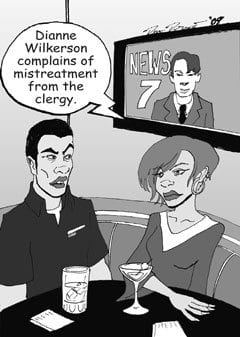
Ecclesiastical malpractice
It’s a longstanding Christian tradition for ministers to comfort and console not only the victims of crime, but also the alleged perpetrators. In fact, the Catholic Church has formalized the process of extending ecclesiastical grace to offenders. One of the church’s seven holy sacraments is penance, also called reconciliation. A believer can seek out a priest for confession to receive penance. None of the Western judicial systems will require the priest to divulge the identity of the penitent or the contents of confessions.
Somewhat akin to the sacrament of reconciliation is the right of sanctuary. The church has always been a place where those who seek refuge can remain safe from the police and prosecutorial authorities that might be asserting their jurisdiction at the church’s door. It is this tradition that has prevented the Catholic Church from summoning the police to remove forcefully those parishioners who have taken control of churches that have been scheduled to be closed by the archbishop.
Apparently these traditions have lost their appeal to those who discuss former state Sen. Dianne Wilkerson’s recent letter of protest against the black clergy. As a person accused of a crime, has she lost her right to comfort and consolation from the clergy? What right did they have to demand that she resign her office? Was it wise for them to intervene in the political issues involved, especially since Wilkerson had already lost the election and would be replaced on Jan. 7, 2009?
Today the black clergy have a difficult role to play. During the civil rights movement they were prominent, but those issues of human rights were tailor-made for them. Involvement in political and business issues subjects them to criticism from the community because of the complexity of those matters. Cases of racial discrimination in employment, education and places of public accommodation left little room for ambiguity in public opinions. However, political questions always leave room for nuance.
The black community was embarrassed by the arrest of their state senator. Indeed, Wilkerson had to feel humiliated by the charges. She could see her future professional opportunities evaporate with the indictment. This was a classic occasion for clerical consolation and redemption. According to Wilkerson, though, the ministers did little more in their meeting with her than express the community’s disappointment.
Wilkerson’s alleged misdeeds seem petty compared to the allegations leveled at House Speaker Salvatore F. DiMasi. The public will not know for some time whether the indictment of his friend Richard Vitale will produce evidence of a payoff to DiMasi. And it will be sometime before anyone knows for certain whether the charges against Wilkerson can be sustained in court.
In the meantime, DiMasi enjoys the respect of his peers and paeans to his political achievement have been published in the Boston Globe. On the other hand, Wilkerson suffers in solitary ignominy. Still, there are many who appreciated her contributions as an effective state senator.
Wilkerson’s conflict with the clergy illustrates a serious conundrum. While some ministers will be able to merge the ecclesiastical and the political, others will not. At a time when spiritual healing is in great demand, it would be unfortunate for people to lose faith in the clergy.






